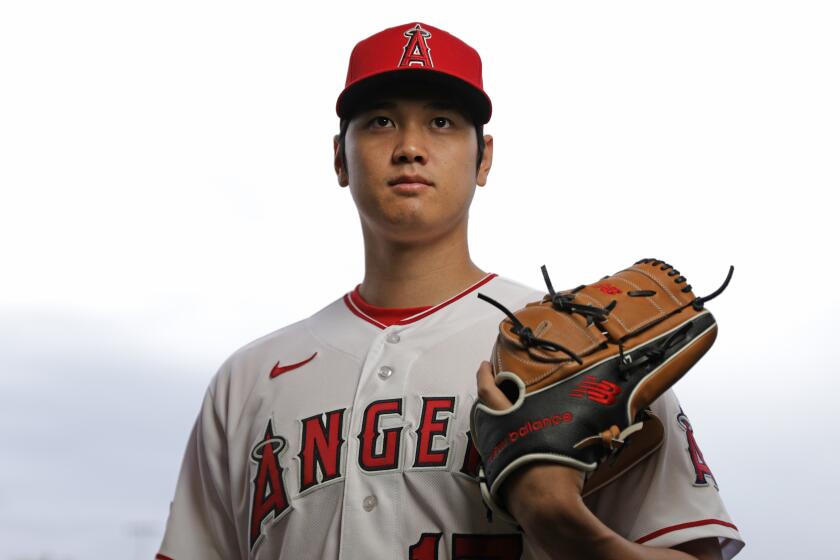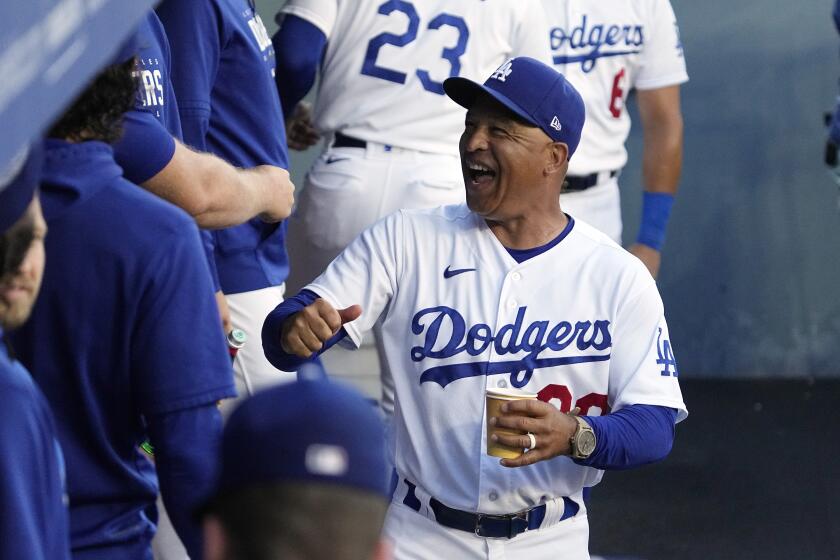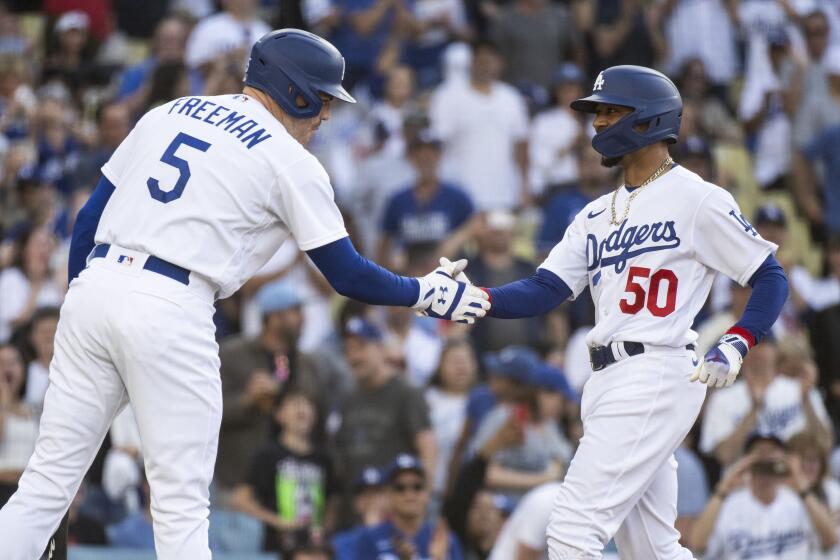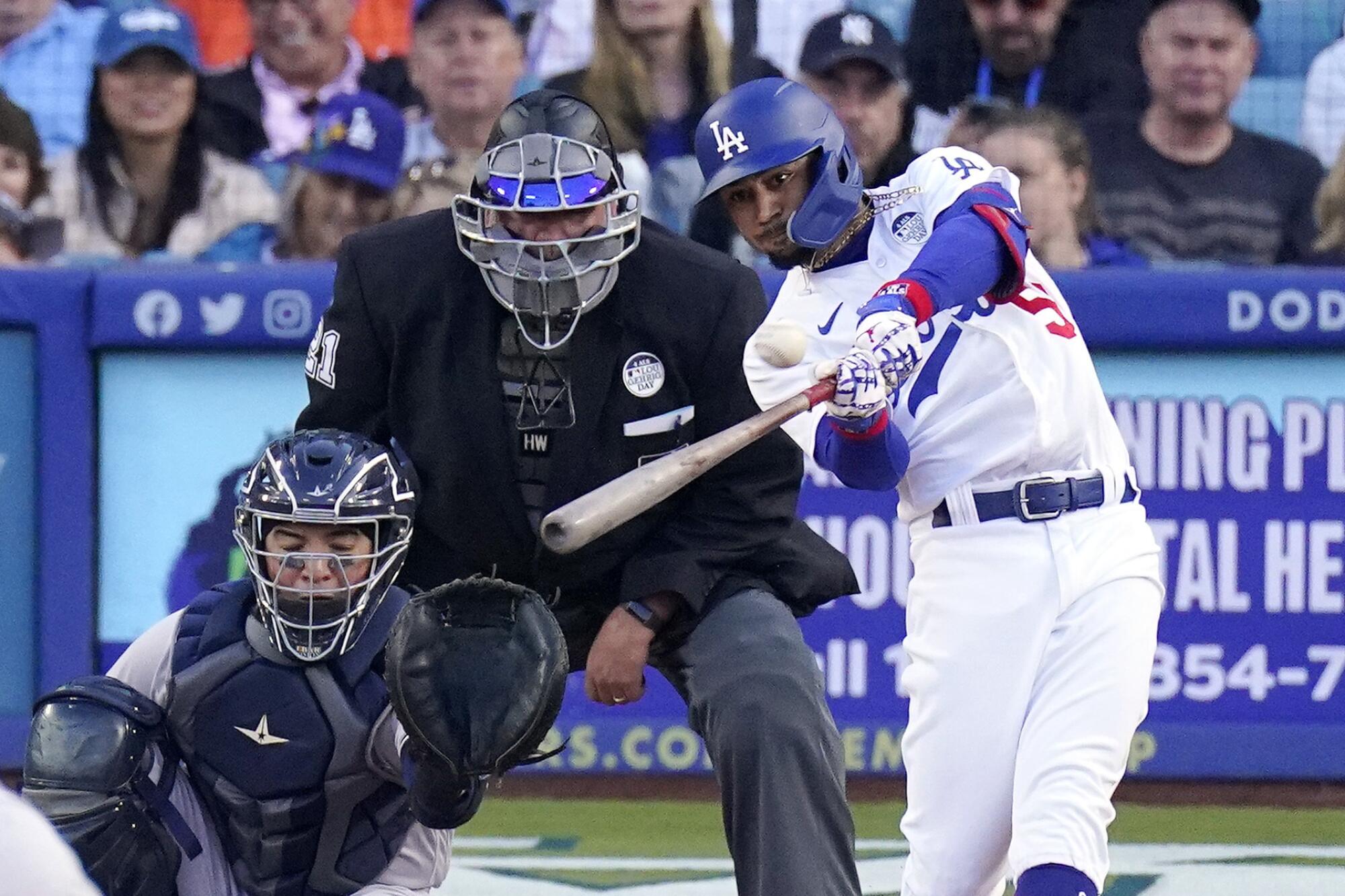
- Share via
SEATTLE — When Mookie Betts says he doesn’t hit home runs in batting practice, he isn’t kidding.
During a recent pregame session at Dodger Stadium, the superstar outfielder sprayed balls from foul line to foul line during four turns inside the cage. He scorched line drives into the outfield gaps. One-hoppers through the infield. A string of fly balls that landed near the warning track.
The one thing Betts didn’t do, however, was send any souvenirs to the outfield pavilions, muscling zero balls over the fence during his 20-minute session.
For someone of Betts’ slugging prowess, it made for a peculiar sight.
Twice the Dodgers were considered the favorites to land Shohei Ohtani. Twice the Dodgers failed. Why will it be different this offseason with the organization’s white whale?
At the All-Star break, the 30-year-old is tied for third in the majors in home runs (26) and is second in slugging percentage (.586). Since 2016, only seven players have amassed more homers than his 216 (Betts’ career total is 239).
He might not look like a prototypical power hitter, with his 5-foot-9 frame listed generously at 180 pounds.
He doesn’t have the same violent swing as other premier sluggers, either, adopting a more quick, controlled motion that impacts the baseball like a hyper-coiled spring.
“It’s a really efficient swing,” Dodgers first base coach Clayton McCullough said. “There’s a lot of twitch in there and a lot of bat speed. His ability to create some torque, it amazes me sometimes.”
Still, shouldn’t someone of Betts’ track record put on more of a show in BP, and at least launch some towering shots into the seats?
No, according to longtime teammate and close friend J.D. Martinez. Exactly the opposite, actually.
“I tell him all the time, ‘Bro, whenever you suck, you hit homers in BP, ’ ” Martinez said last week, having learned by now that Betts only does so when he’s pressing. “I don’t consider Mookie as a ‘power hitter.’ I consider him an elite contact hitter, who hits the ball the right way.”
It’s hardly a unique take on Betts’ game, the kind of nuanced delineation that has tempered expectations about how he will perform Monday night in the Home Run Derby at T-Mobile Park in Seattle.
Las Vegas sportsbooks have given Betts the third-longest odds to win. Manager Dave Roberts light-heartedly acknowledged that he’s “not betting on him” against the eight-man field.
Even Betts himself joked that, given his undersized stature, his only goal is “not to come in last.”
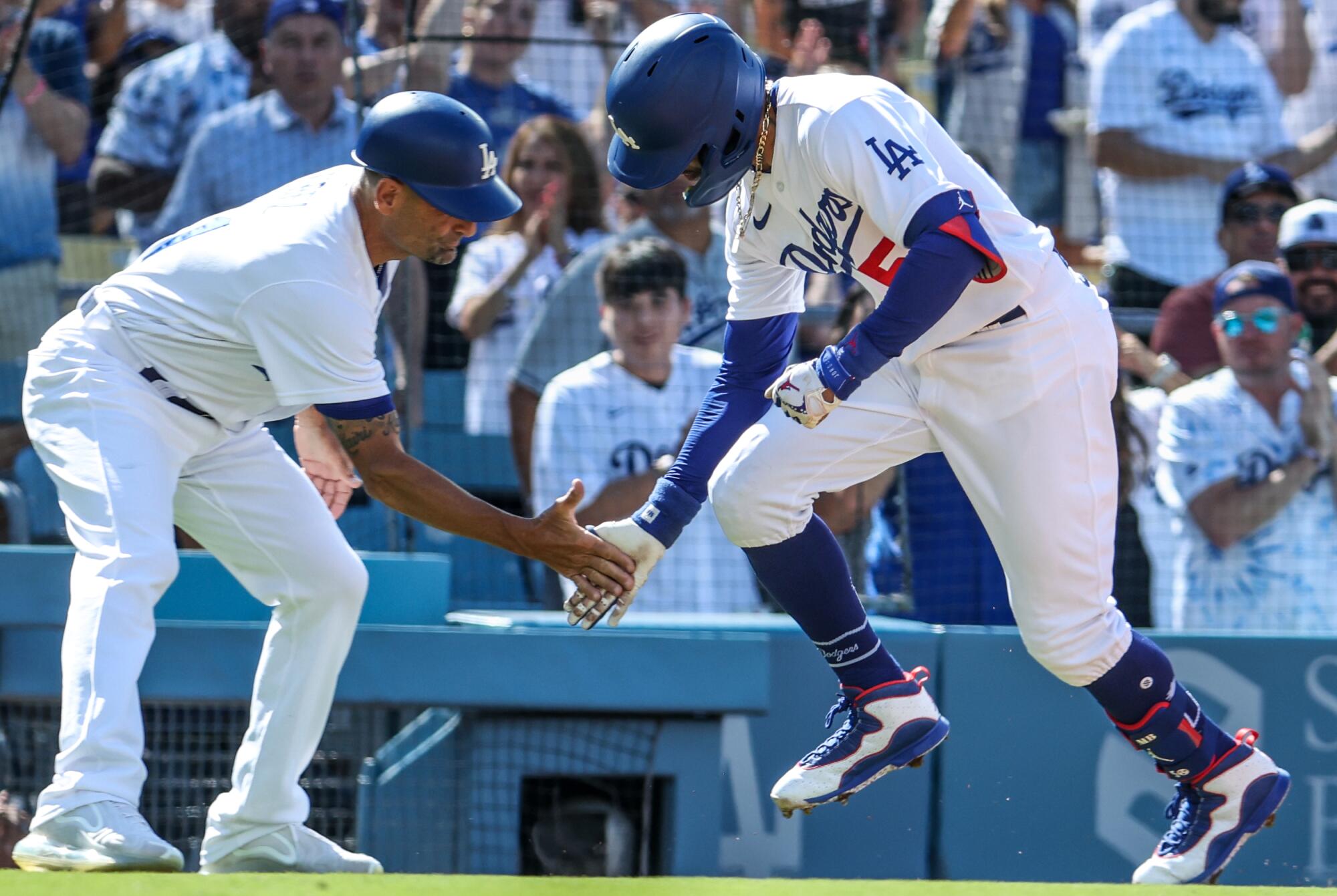
“Uh, I’m 5-9, 170 pounds,” Betts deadpanned. “I don’t think that many guys my size win the Home Run Derby.”
Martinez understands the doubts.
“Is he gonna hit the ball 480?” he asked rhetorically. “It’s not happening. Forget it.”
Yet, he remains bullish on his teammate’s chances, confident that even if Betts doesn’t look the part, or make much noise in daily rounds of batting practice, there is plenty of subtle slug still lurking in his swing.
“If anyone can do it,” Martinez said, “it’s him.”
As a young player rising through the Boston Red Sox organization a decade ago, Betts always displayed “sneaky pop,” as former Red Sox minor league hitting coordinator Tim Hyers recalled.
Betts hit the ball hard, batting .316 in Boston’s farm system. He never lacked for home runs, collecting 27 in his final two minor league seasons.
For the most part, though, he was a line-drive hitter, more often scorching doubles off the wall than rocketing home runs over it.
“I don’t think anyone doubted he could drive the baseball,” Hyers said. “But no one predicted the power he is showing now.”
Betts was chief among them.
After breaking into the big leagues in 2014, Betts initially saw himself as more a prototypical leadoff hitter — valuing contact and on-base percentage over home runs and slugging statistics.
The sneaky pop was still there, with Betts hitting 31 home runs in a breakout 2016 campaign, when he also batted .318, won Gold Glove and Silver Slugger awards, and finished third in MVP voting.
But, just like in the minors, he typically hit the ball on the ground, lifting fly balls at a below-league-average rate of 21.7%.
“He played the game like a leadoff hitter,” Hyers said. “Getting on base was really important to him, to help the team win.”
Dave Roberts is encouraged by the way this year’s Dodgers have responded to extreme adversity, but will it really be enough to win a World Series?
In 2017, however, the then 24-year-old suffered a step back.
Though still an All-Star, Betts’ batting average dipped to .264. He posted a career-low .803 on-base-plus-slugging percentage. And after hitting only 24 homers, he entered 2018 with more of an open mind, pondering ways he could revamp his game and upgrade his swing.
That’s when Hyers returned to the Red Sox organization, becoming their big league hitting coach after two years on the Dodgers staff.
It’s also when Martinez entered Betts’ life, signed by the Red Sox to a $110-million contract after revitalizing his career with a well-documented swing change he learned in part from Robert Van Scoyoc, a current Dodgers co-hitting coach who was previously a private instructor.
Early that season, both Hyers and Martinez (who also connected Betts with Van Scoyoc later that year) helped Betts craft a new swing.
Martinez explained some of the principles of baseball’s launch angle revolution. How to incorporate his lower half and hips to create power. How to stay through a pitch and barrel up balls more consistently. How to adjust the plane of his swing to send his line drives on a higher and more potent trajectory.
“It was a lot of check-ins,” Betts said. “He would give me a test, I would go do the test, and then report back and see how I did.”
Hyers helped Betts formulate a new routine of drills, mimicking the same program Martinez had used to become one of the majors’ top slugging threats (Martinez is one of the seven hitters with more homers than Betts since 2016).
They were new concepts to Betts, a novice student of advanced swing mechanics — “I had never heard of that stuff,” he said — who now credits Martinez, Hyers, Van Scoyoc and former Boston assistant hitting coach Andy Barkett for his transformation.
“It was just the right time,” Hyers said. “Mookie had been in the league a little while. He’d had success, but he wanted to take it to another level. Once he learned some of the things I was talking about, J.D. was talking about, it was like, ‘Ah-ha. I can do this.’ And he went to work.”
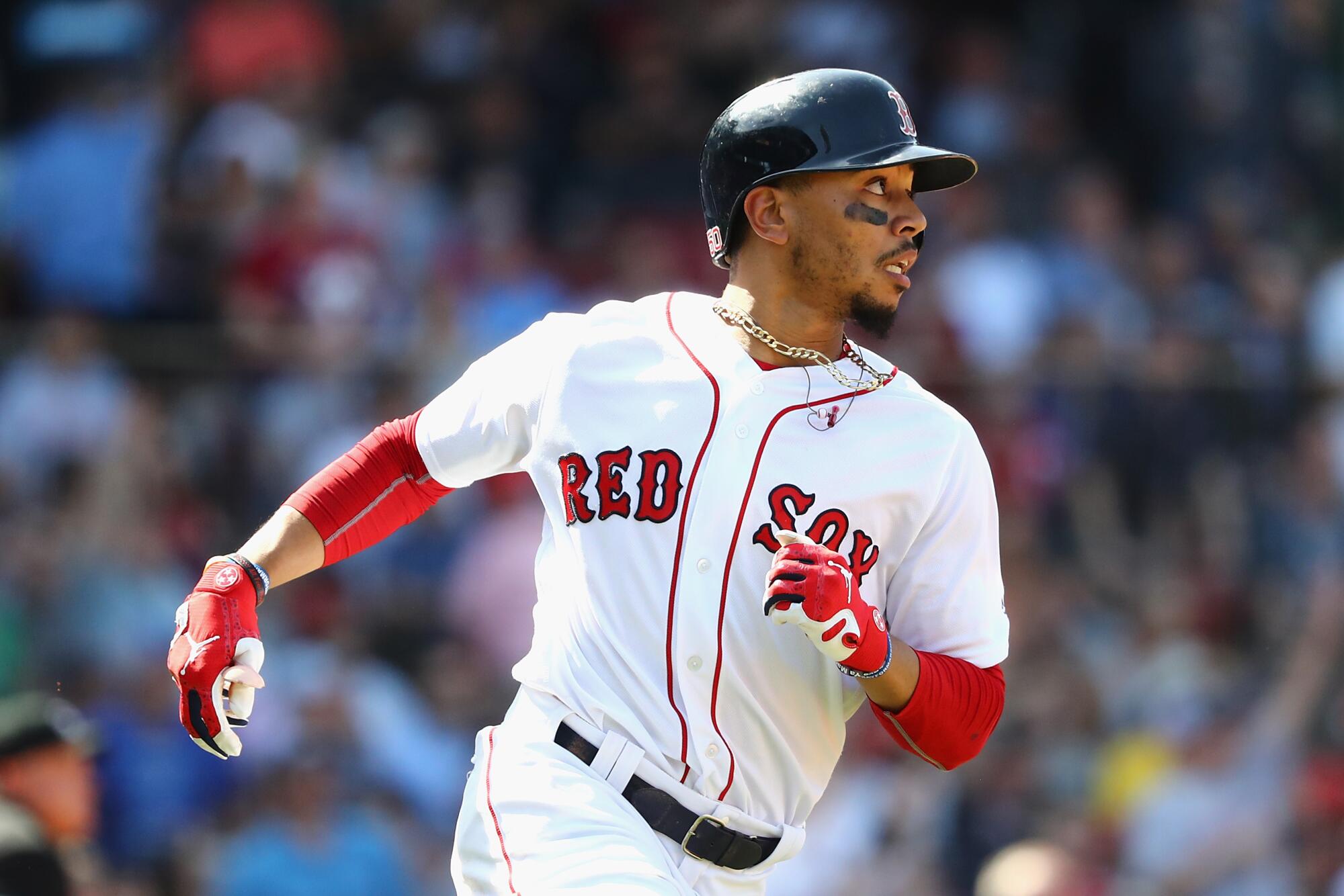
The results were almost immediate.
In 2018, Betts hit a career-high 32 home runs and led the majors in slugging percentage (.640) and batting average (.346), winning the MVP award and helping the Red Sox win the World Series.
“J.D. would say, ‘Yup, Mookie’s got his tennis racket back out,’ ” Hyers said. “Because everything he hit, it was squared up.”
After hitting 29 home runs in 2019, Betts was traded to the Dodgers in 2020 and led them with 16 homers (in just 55 games) during another run to a World Series title.
Betts was limited by a hip injury in 2021 but bounced back last season, setting a career high with 35 home runs that tied for eighth most in the majors.
And following a sluggish start this season, Betts caught fire going into the All-Star break, crushing nine home runs in his last 15 games — including a 10th leadoff home run Saturday, the most in a season in Dodgers history.
“I still kind of see myself as a regular, typical, get-on-base leadoff hitter,” Betts said earlier this year. “But you just kind of step back and look, my profile definitely changed.”
Reunited as teammates again this season in Los Angeles, Martinez provides a striking contrast to Betts at the plate.
He looks much more like a natural slugger, with his towering 6-3 frame and explosive upward swing.
The same day Betts went without a homer in batting practice, Martinez at one point clobbered three in a row with ease.
With 22 home runs this season, Martinez would have had interest in participating in Monday’s derby, had his preferred pitcher, McCullough, not already been tabbed by Betts for the event.
Still, Martinez knows the kind of approach he would have employed, expecting to see the same from this year’s other big-bodied, big-swinging participants — such as Luis Robert Jr. (6-2, 220), Pete Alonso (6-3, 245) and Betts’ first-round opponent, Vladimir Guerrero Jr. (6-2, 245).
“These [other] guys, all they try to do is swing as hard as they can, and if they hit, or even clip it, it’s gonna go,” Martinez said. “Mookie doesn’t have that.”
What he does have, however, is an enhanced version of his sneaky pop, capable of blasting towering drives with seemingly minimal effort in his swing.
It’s why Martinez isn’t counting Betts out in Monday’s derby, advising his teammate of a different game plan for the event.
The Dodgers scored a 10-5 win over the Angels at Dodger Stadium on Saturday and enter the All-Star break grateful injuries didn’t leave a bigger dent.
“Try to see how soft you can hit one out,” Martinez told Betts. “If you sit there and try to hit haymakers, you’re gonna go against your strength. Just catch the ball on the barrel … and the pitcher, the ball, the bat, that provides all the energy.”
Basically, it’s a Home Run Derby version of the way Betts generates power in regular season games — a microcosm of the process that took him from a quality contact hitter to an all-around superstar at the plate.
It might not lead to a derby win, or many draw-dropping home runs in batting practice.
But it has turned Betts into one of baseball’s most prolific, and unlikely, long ball hitters — having long emerged as one of the best pound-for-pound sluggers in the major leagues.
“Just watching from afar, he has continued to get more smooth, more compact,” said Hyers, now the Texas Rangers’ hitting coach. “You can just tell he has taken ownership of the move, of the swing. It just looks second-nature to him now.”
More to Read
Are you a true-blue fan?
Get our Dodgers Dugout newsletter for insights, news and much more.
You may occasionally receive promotional content from the Los Angeles Times.

